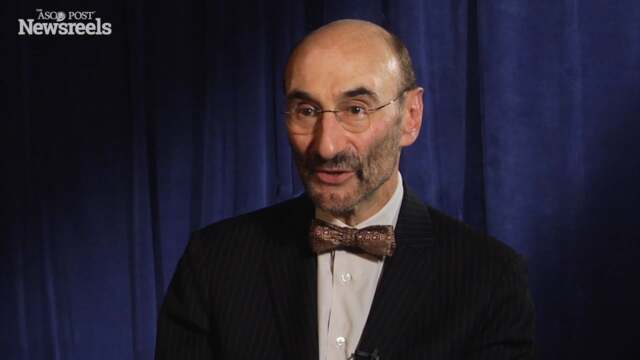A. Oliver Sartor, MD, on Results of the ALSYMPCA Trial for Castration-Resistant Prostate Cancer
A. Oliver Sartor, MD, of Tulane University School of Medicine, discusses the latest results of a clinical trial on radium-223 dichloride and the improvement in overall survival of men with advanced prostate cancer (Abstracts 2510, 2530).
Bruce Minsky, MD, on Clinical Trial Results: The ASCENDE-RT Trial and a Multicenter Study on Prostate Cancer
Bruce Minsky, MD, of MD Anderson Cancer Center, discusses two important papers: results from a prospective trial on quality-of-life outcomes for low-risk HPV-associated oropharyngeal squamous cell carcinoma, and a prostate cancer radiation therapy study (Abstracts 3, 4).
Anthony Zietman, MD, on Accelerating Treatment: RTOG 0415 Study on Prostate Cancer
Anthony Zietman, MD, of Massachusetts General Hospital, discusses the practice-changing results from a study comparing fractionation schedules in patients with low-risk prostate cancer (Abstract LBA6).
Anthony Zietman, MD, on Hormonal Therapy and Salvage Radiation: Results of RTOG 9601
Anthony Zietman, MD, of Massachusetts General Hospital, discusses his perspective on the study of bicalutamide during and after radiotherapy in patients following radical prostatectomy and a biochemical relapse (Abstract LBA5).
Howard M. Sandler, MD, on Prostate Cancer: Results of NRG Oncology/RTOG 9601
Howard M. Sandler, MD, of Cedars-Sinai Medical Center, discusses how adding 24 months of daily antiandrogen therapy during and after radiotherapy was shown to significantly improve long-term overall survival following prostate cancer recurrence after a radical prostatectomy (Abstract LBA5).
James B. Yu, MD, on RTOG 0415: Fractionation Schedules in Patients With Low-Risk Prostate Cancer
James B. Yu, MD, of Yale School of Medicine, summarizes the plenary lecture on results from the NRG Oncology/phase III study comparing two fractionation schedules for low-risk prostate cancer (Abstract LBA6).
Howard M. Sandler, MD, on Prostate Cancer: Results From RTOG 0415
Howard M. Sandler, MD, of Cedars-Sinai Medical Center, discusses this phase III noninferiority study comparing two fractionation schedules in patients with low-risk prostate cancer (Abstract LBA6).
Christopher Brian Allard, MD, on Prostate Cancer Risk and Regular Aspirin Use
Christopher Brian Allard, MD, of Brigham & Women's Hospital, reports on results of the Physicians’ Health Study, which showed that regular aspirin use decreased the risk of lethal prostate cancer in a cohort of American doctors (Abstract 306).
Maha Hussain, MD, on Prostate Cancer: Keynote Lecture
Maha Hussain, MD, of the University of Michigan, gives her expert perspective on changes in the treatment of hormone-naive disease.
W. Robert Lee, MD, on Prostate Cancer: Results of the NRG Oncology RTOG 0415 Study
W. Robert Lee, MD, of Duke University, discusses this phase III non-inferiority study comparing two fractionation schedules in patients with low-risk prostate cancer (Abstract 1).
Paul L. Nguyen, MD, on Prostate Cancer: Results of the NRG Oncology/RTOG 9601 Study
Paul L. Nguyen, MD, of Dana-Farber Cancer Institute, discusses this phase III trial in which prostate cancer patients were given antiandrogen therapy with bicalutamide during and after salvage radiation therapy following radical prostatectomy and an elevated PSA (Abstract 3).
Fred Saad, MD, on Prostate Cancer: The Year in Review (French Language Version)
Fred Saad, MD, of the University of Montreal, summarizes in French his session on the latest treatment developments in prostate cancer, including the role of chemotherapy in hormone-sensitive disease.
Fred Saad, MD, on Prostate Cancer: The Year in Review
Fred Saad, MD, of the University of Montreal, summarizes his session on the latest treatment developments in prostate cancer, including the role of chemotherapy in hormone-sensitive disease. To see the French language version of this video, click here.
David P. Dearnaley, MD, on Prostate Cancer: Results from the CHHiP Trial
David P. Dearnaley, MD, of The Royal Marsden NHS Foundation Trust, discusses the comparison, in this study, of hypofractionated high-dose IMRT schedules for prostate cancer (Abstract 2).
A. Oliver Sartor, MD, on Advanced Prostate Cancer: Predicting Treatment Resistance
A. Oliver Sartor, MD, of Tulane Cancer Center, discusses this study investigating circulating tumor cell characteristics to predict resistance to androgen deprivation therapies in patients with advanced prostate cancer (Abstract 163).
Even After Antiandrogen Therapy, Docetaxel Remains Useful in Prostate Cancer
A study presented at the 2016 Genitourinary Cancers Symposium showed that 40% of patients with metastatic castration-resistant prostate cancer treated with docetaxel following abiraterone (Zytiga) had at least a 50% reduction in prostate-specific antigen (PSA), demonstrating the activity of this...
DNA Damage and Repair Pathway Signature May Be Associated With Prognosis After Prostatectomy in High-Risk Prostate Cancer
In a study reported in JAMA Oncology, Evans et al identified a DNA damage and repair pathway gene signature that was significantly associated with outcomes after prostatectomy for high-risk prostate cancer independent of standard clinicopathologic factors. Study Details The study involved 1,090...
Death Rates Significantly Reduced for Men Having Radical Prostatectomy vs Watchful Waiting
Estimated 15-year results from the Scandinavian Prostate Cancer Group Study (SPCG-4) show that men diagnosed with early prostate cancer and randomly assigned to radical prostatectomy continued to have significantly reduced rates of death from prostate cancer, death from any cause, and risk of...
Sunitinib/Prednisone Improves Progression-free Survival but not Overall Survival in Metastatic Castrate-resistant Prostate Cancer
According to M. Dror Michaelson, MD, PhD, second-line therapy with sunitinib (Sutent) and prednisone improves progression-free survival but not overall survival in men with metastatic castrate-resistant prostate cancer previously treated with docetaxel-based chemotherapy. Dr. Michaelson, of the...
Cabozantinib Shows Encouraging Activity in Metastatic Castrate‑resistant Prostate Cancer
Cabozantinib, a dual inhibitor of MET kinase and the vascular endothelial growth factor (VEGF) receptor, exhibits high, early single-agent activity in men with metastatic castrate-resistant prostate cancer, according to Maha Hussain, MD, FACP, who presented these findings at the 2011 ASCO Annual...
Final Decision on Sipuleucel-T
The Centers for Medicare & Mediaid Services (CMS) issued a final decision to cover FDA-approved indications of sipuleucel-T (Provenge) in prostate cancer, calling the treatment “reasonable and necessary.” The CMS final decision assures provider reimbursement of sipuleucel-T for Medicare...
Optimizing Treatment for Advanced Prostate Cancer Requires Shifting Focus from Individual Drugs to Integrated Therapies
Newer drugs, including sipuleucel-T (Provenge), cabazitaxel (Jevtana), and abiraterone (Zytiga), can extend survival modestly and ease symptoms for men with advanced prostate cancer. Maximizing the benefit to patients will require shifting the focus from developing individual drugs to developing...
New Safety Information Reported for 5-alpha Reductase Inhibitors
The FDA announced that the Warnings and Precautions section of the labels for the 5-alpha reductase inhibitor class of drugs has been revised to include new safety information about the increased risk of being diagnosed with high-grade prostate cancer. This risk appears to be low, but health-care...
Intermittent or Continuous Androgen Suppression Produces Comparable Survival after Radical Therapy in Prostate Cancer
Men with prostate cancer who receive intermittent courses of androgen-suppressing therapy can live as long as those who are treated with continuous therapy, according to results of a recently concluded study. Until now, standard treatment has consisted of continuous therapy, but this is expected to ...
Androgen Deprivation Therapy plus Radiotherapy Increases Survival in Men with Localized Prostate Cancer
The addition of short-term androgen deprivation therapy to radiotherapy for men with stage T1b, T1c, T2a, or T2b prostate adenocarcinoma and a prostate-specific antigen (PSA) level of 20 ng/mL or less “conferred a modest but significant increase in the 10-year rate of overall survival, from 57 to...
At 5 Years, Brachytherapy Shows Quality-of-life Advantages over Radical Prostatectomy for Favorable-risk Prostate Cancer
Five years after treatment for favorable-risk prostate cancer, men who either chose or were randomly assigned to receive brachytherapy reported quality-of-life advantages in urinary and sexual domains and in patient satisfaction compared to men who received radical prostatectomy, according to a...
Keeping a Positive Attitude
I’ve been in alcohol and drug recovery for 20 years, and my wife of nearly 50 years, Arlene, and I have been through a lot together during that time. So 2 years ago, when my doctor told us that I had stage III prostate cancer and a Gleason score of 8, we both looked at him and asked if we could...
Androgen Deprivation plus Radiotherapy Increases Survival in Men with Localized Prostate Cancer
Adding short-term androgen-deprivation therapy to radiotherapy “conferred a modest but significant increase in the 10-year rate of overall survival, from 57% to 62%,” in men with localized prostate cancer enrolled in Radiation Therapy Oncology Group (RTOG) trial 94-08. “This increase was...
Long-term Data Show Benefit of Degarelix Beyond 3 Years in Advanced Hormone-dependent Prostate Cancer
Degarelix (Firmagon) is effective and well tolerated beyond 3 years in patients with advanced prostate cancer, according to a recent study published in The Journal of Urology.1 The new study (CS21A) extends the conclusions of the pivotal phase III study (CS21) in which the risk of prostate-specific ...
Radium-223 Chloride Gets Fast Track Designation
Bayer HealthCare Pharmaceuticals, Inc, announced that its investigational compound radium-223 chloride, which is exclusively licensed from Algeta ASA, has been granted Fast Track designation by the FDA for the treatment of castration-resistant (hormone-refractory) prostate cancer in patients with...
Action Date Set for Denosumab Supplemental Application
Amgen announced that the FDA will target a Prescription Drug User Fee Act (PDUFA) action date of April 26, 2012, for the supplemental Biologics License Application to expand the indication for denosumab (Xgeva) to treat men with castrate-resistant prostate cancer to reduce the risk of developing...
Short-term Androgen Deprivation plus Radiotherapy Improves Outcomes in Intermediate-risk Prostate Cancer
The addition of short-term androgen-deprivation therapy to external-beam radiation therapy improved overall and disease-specific survival in men with nonbulky localized prostate cancer and prostate-specific antigen (PSA) levels up to 20 ng/mL, as reported recently in The New England Journal of...
FDA Approves Denosumab to Increase Bone Mass in Patients with Cancer
Denosumab (Prolia) recently received FDA approval as a treatment to increase bone mass in patients at high risk for fracture receiving androgen deprivation therapy for nonmetastatic prostate cancer or adjuvant aromatase inhibitor therapy for breast cancer. Pivotal Trials The approvals were based...
International Prostate Cancer Studies Report Inroads in Managing Bone Metastases
Treatment and prevention of bone metastases in patients with prostate cancer is coming of age, according to several studies presented at the European Multidisciplinary Cancer Congress (ECCO/ESMO/ESTRO). Among the most impressive studies reported was an international phase III trial of radium-223,...
Novel Management Strategies Assessed in Renal Cell and Prostate Cancers
At the Best of ASCO Miami meeting, William Oh, MD, of the Tisch Cancer Institute, Mount Sinai School of Medicine, New York, described new trends and remaining questions in the management of renal cell and prostate cancers. Axitinib vs Sorafenib in Second-line RCC Axitinib, a potent and selective...
Physicians Can Help Patients Set Realistic Expectations for Sexual Functioning after Treatment for Prostate Cancer
Models that can be personalized to predict erectile function of individual patients following treatment for early-stage prostate cancer have been developed and validated in a study involving a total of 2,940 men, and are ready for use in clinical practice, according to Martin G. Sanda, MD, the...
Hypofractionated Radiotherapy Effectively Controls High-risk Prostate Cancer
The use of hypofractionated intensity-modulated radiotherapy (IMRT) appears to be a reasonable option for men with intermediate- to high-risk prostate cancer,1 reported Alan Pollack, MD, Chairman of Radiation Oncology at the University of Miami Miller School of Medicine in Miami and lead...
Fewer Rectal Side Effects with IMRT than with 3D-CRT for Prostate Cancer
The use of intensity-modulated radiation therapy (IMRT) is associated with fewer acute and late toxic effects than is three-dimensional conformal radiation therapy (3D-CRT) in men with localized prostate cancer, according to preliminary analysis of the Radiation Therapy Oncology Group (RTOG) 0126...
Prostate Cancer Screening Reconsidered
Prostate cancer is the most prevalent nonskin cancer in men. An estimated 16% of men are diagnosed with prostate cancer, yet only 3% of men die from it.1 Unlike other cancers, prostate cancer is associated with a prolonged lead-time, meaning it can take anywhere from 5 to 12 years to become...
What You Should Know about Denosumab (Prolia) for Increasing Bone Mass during Breast and Prostate Cancer Therapies
In the Clinic provides overviews of novel oncology agents, addressing indications, mechanisms, administration recommendations, safety profiles, and other essential information needed for the appropriate clinical use of these drugs. Indications In September 2011, the monoclonal antibody RANKL...
Sipuleucel-T Should Be Used Early in Metastatic Castrate-resistant Prostate Cancer, before Chemotherapy
When sipuleucel-T (Provenge) was approved by FDA in April 2010, it was the first vaccine to be approved as a treatment for prostate cancer and was hailed as a major advance. Although sipuleucel-T is now reimbursable by Medicare, some physicians are not clear about when to use it, and patients who...
Data on Watchful Waiting for Low-risk Prostate Cancer May Swing Focus to Higher-risk Tumors and Quality of Life
Surgery did not increase survival rates compared to watchful waiting in men with clinically localized prostate cancer. Results were particularly strong for men with prostate-specific antigen (PSA) levels of 10 ng/dL and under, and those who have low-risk disease, according to data from the Prostate ...
NIH Panel Endorses Active Surveillance in Low-risk Prostate Cancer
Active surveillance of localized prostate cancer is a viable management option that should be offered to low-risk patients in place of immediate treatment, said a panel of experts convened by the National Institutes of Health. A fairly new concept, active surveillance takes a more proactive...
Risk of Sexual and Continence Problems No Lower with Robotic than with Open Surgery
Although robotic-assisted laparoscopic radical prostatectomy “is eclipsing open radical prostatectomy among men with clinically localized prostate cancer,” the risks of problems with sexual functioning and continence are no lower with robotic than open surgery, according to a study in the Journal...
Abiraterone: New Drug in the Treatment of Metastatic Castration-resistant Prostate Cancer
In the Clinic provides overviews of novel oncology agents, addressing indications, mechanisms, administration recommendations, safety profiles, and other essential information needed for the appropriate clinical use of these drugs. Indication Abiraterone acetate (Zytiga) (an oral agent that...
Two Novel Agents Prolong Survival in Advanced Prostate Cancer
Two novel agents with distinct mechanisms of action join ranks of treatments that extend survival for patients with castration-resistant prostate cancer: MDV3100 and radium-223. Both drugs achieved a survival advantage compared with placebo, with relatively benign side-effect profiles, according to ...
First Urine-based Molecular Test to Gauge Need for Repeat Prostate Biopsies
Gen-Probe announced the FDA has approved its PROGENSA PCA3 (prostate cancer gene 3) assay, the first molecular test to help determine the need for repeat prostate biopsies in men who have had a previous negative biopsy. “Overexpression of the PCA3 gene is highly specific to cancerous prostate...
ODAC Votes against Denosumab to Delay Bone Metastasis in Men with Castration-resistant Prostate Cancer
The FDA’s Oncologic Drugs Advisory Committee (ODAC) voted 12 to 1 that the risk-benefit ratio was insufficient for an expanded use of denosumab (Xgeva) to delay the spread of prostate cancer to the bone in men with castration-resistant disease. The panel was not asked specifically whether it...
Immune Changes Reported with Early Use of Sipuleucel-T in Neoadjuvant Setting for Prostate Cancer
Sipuleucel-T (Provenge) can generate a circulating immune response to treat men with metastatic castrate-resistant prostate cancer, as per its FDA-approved indication.1 A neoadjuvant trial was performed to investigate whether earlier use of sipuleucel-T can generate an immune response in the...
Important News Briefs: New Data Reported in Prostate, Bladder, and Kidney Cancers
The recent 2012 Genitourinary Cancers Symposium featured a wealth of presentations on prostate, bladder, kidney, and other genitourinary cancers. Brief summaries of some of the oral and poster sessions are presented. Exercise and Recurrence Vigorous exercise has been shown to reduce cancer...















